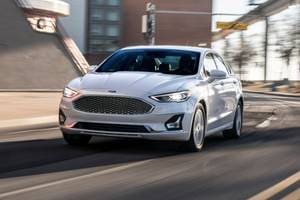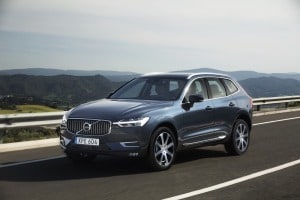Oklahoma Sales Booming, So What's Up With Texas?
New-vehicle sales in Oklahoma and North Dakota are booming, which is understandable as those states are flush with new oil-and-gas development these days. Equally sensible is what new-car registration figures tell us about the awful economies of California and Michigan. But why aren't sales also spiraling upward in energy-rich Texas? And why has Iowa managed flat sales over the last four years when most of the rest of the Midwest has performed poorly on a relative basis? These are among the interesting economic glimpses contained in R.L. Polk new-car sales-registration data that has been analyzed by Edmunds.com.
 While Polk's registration information doesn't exactly mirror sales figures from the same year, "They line up about 90 percent with sales figures for any given time period," according to Ivan Drury, U.S. industry analyst for Edmunds.com. Among the small fragments missing from the registration data are dealer and manufacturer vehicles, he said. Additionally, Polk data is based on month of registration of a vehicle compared with the sales month for the vehicle that is announced by the manufacturers.
While Polk's registration information doesn't exactly mirror sales figures from the same year, "They line up about 90 percent with sales figures for any given time period," according to Ivan Drury, U.S. industry analyst for Edmunds.com. Among the small fragments missing from the registration data are dealer and manufacturer vehicles, he said. Additionally, Polk data is based on month of registration of a vehicle compared with the sales month for the vehicle that is announced by the manufacturers.
One thing that immediately jumps when the data is examined in whole: despite building enthusiasm within the industry over the prospects of a second consecutive year of double-digit sales gains for the U.S. market, for 2011 — and the prognostication of a similar gain for 2012 industry sales — the American auto industry remains only a shadow of its former self. Auto sales peaked at about 17 million units in 2000 and held to near that level until 2007, serving as one of the main engines of a robust period of U.S. economic growth that had begun in the Nineties. When sales crashed to just 10.4 million units in 2009, in the midst of the Great Recession, industry hopes of ever seeing 17-million-unit years again evaporated.
State Stories
Forecasters still don't foresee a return to such robust volume levels for several years, if then. So in the meantime, the downsized industry has forged a certain contentment with operating — profitably, now — in a 12- to 13-million-unit environment. And the state-level data and rankings from 2007 and 2011, covering January through August each year, amplify the change in interesting ways, demonstrating just how difficult and varied many of the 50 mini-environments for sales have been. Registrations in California, for instance — by far America's largest car market, typically with about 10 percent of retail sales — plunged 38 percent between 2007 and 2011. Registrations also tanked in No. 2 Texas, which has been associated with recent economic growth, by 30 percent over the last four years. In the nation's third-largest market, Florida, there has been a similar story unfolding: January-through-August registrations this year were 31 percent fewer than in the same period in 2007.
Yet there have been some interesting growth stories over the same period as well. In Oklahoma, registrations nearly doubled over the four years, burgeoning to a 92-percent higher level this year. Similarly, North Dakota saw its registrations grow by 24 percent. Even Iowa — nearly alone in the economically troubled Midwest — held its own, with a decline of just 2 percent in registrations while neighboring Minnesota, Wisconsin, and Illinois suffered declines of 32 percent, 20 percent and 17 percent, respectively.
But economists said there are logical explanations for all of this. Overall, "The states that 'moderated' the loss of auto sales (or registrations) or exhibited outright growth are principally states with strong energy and agriculture economies," said said David Littmann, the former chief economist for Comerica Bank who now is a consultant. "Those states typically have had the best income growth and lowest unemployment rates over the last four years. Meanwhile, states with pummeled consumer confidence and weakened outlays for durable goods, stemming in part from huge mortgage foreclosures, are subject to adverse comparisons." Here's how such dynamics played out for auto registrations in a handful of states:
Oklahoma
The Sooner State surged to No. 5 in auto registrations for the January-through-August period this year compared with its No. 16 rank in 2007, riding a near-doubling of total registrations, to 215,103 for this year's period. Drury characterized the skyrocketing results for Oklahoma as a surprise to him though he's an auto-data maven. "I had to run the data three times to make sure," he said. "But you don't have to dig too deeply to see how well the state is doing." A surge in oil and natural-gas exploration and production is the biggest part of the explanation, Littman said. Oklahoma jumped nine places in the ranking, while no other state boosted its ranking during the covered period by more than five spots.
North Dakota
Essentially, the old-fashioned energy-exploration boom being experienced by North Dakota accounted for its rise to No. 47 from No. 50 in the rankings, with the registration of just 4,157 more vehicles than four years ago driving North Dakota's rise.
California
California's dismal showing in auto registrations over the last few years largely reflects the loss of household wealth caused by taking the brunt of some of the nation's worst economic problems, including the housing bust. "Housing problems cause tremendous negative wealth effects," said Dana Johnson, also a former chief economist with Comerica. "People have no ability to borrow against the value of their house. Also, California had one of the very largest increases in the unemployment rate and one of the highest overall unemployment rates," over this period. Johnson said that such economic doldrums "continue to hold California back" in automotive purchases.
Texas
Johnson noted that Texas's sales decline of nearly 30 percent was larger than the median sales decline for states during the four-year period "but not night-and-day." He said that while Texas obviously has a huge oil and gas sector, this industry isn't nearly as important to — or as definitive of — the Texas economy these days as it is in North Dakota or even Oklahoma. Texas actually has a highly diversified economy that also relies on high-tech R&D and manufacturing, agriculture and other pursuits, meaning that its behavior in auto registrations will more closely mirror the aggregate of other states'. "You couldn't expect it to be the outlier," Johnson explained, "though I still would have expected its decline to be smaller than the median, not larger."
Iowa
The Hawkeye State moved up from No. 34 to No. 29, despite a decline in actual registrations, largely because of the recent strength of its agricultural economy, including rising prices for corn and other grain commodities to reflect growing worldwide demand, as well as strong recent harvests. "States like Iowa and Nebraska [which climbed to No. 38 from No. 40 despite a 5-percent decline in absolute numbers of registrations] did well on their agricultural bases which, in turn, played well in our international trade, helped by the weakening dollar," Littmann said.
Michigan
Not surprisingly, the domestic home of the auto industry fared poorly over the four years that included the Great Recession and an unprecedented shrinkage of the Big Three automakers. Michigan's rank dropped to No. 10 from No. 6 as it recorded nearly one-third fewer registrations over the covered period. Unemployment and home foreclosures surged during the four-year period.
Indiana
The Hoosier State is second in U.S. manufacturing intensity to Michigan, yet it saw auto registrations decline by only 20 percent over the period as its ranking fell to No. 23 from No. 19. Similarly, unemployment in Indiana peaked at 10.8 percent during the Great Recession versus 14.9 percent in Michigan — despite the fact that the recreational-vehicle industry that anchors much of northern Indiana's economy was hit sooner and harder by the downturn than Michigan's auto industry. Some economists believe Indiana's significantly better performance than that of neighboring Michigan can be attributed in large part to tax policy. "At the beginning of the recession," recently wrote Michael Hicks and Kevin Kuhlman, adjunct scholars for the Mackinac Center for Public Policy, "Indiana was debating property-tax reform. The legislation passed before the deepest economic declines, beginning a three-year tax cut in the state. The same time frame saw Michigan pass a new business tax and then slap on a surcharge before the new [tax] had a chance to become law."
Nevada
By far, the home to the nation's gaming capital of Las Vegas posted the worst relative performance in auto registrations, a loss of 50 percent, and a slide in ranking to No. 35 from No. 28. That was explained by a beating taken by the tourist economy during the Great Recession and how Nevada took much of the brunt of America's housing-industry crisis. "Nevada's consumer confidence was pummeled and there also were weakened outlays for durable goods stemming from huge mortgage foreclosures," Littmann said.





